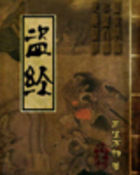Besides, Rabelais wrote other things; and it is only in his romance that he shows literary skill. The conception of it would have entered his mind first only in a bare and summary fashion. It would have been taken up again, expanded, developed, metamorphosed. That is possible, and, for my part, I am of those who, like Brunet and Nodier, are inclined to think that the Chronique, in spite of its inferiority, is really a first attempt, condemned as soon as the idea was conceived in another form. As its earlier date is incontestable, we must conclude that if the Chronique is not by him, his Gargantua and its continuation would not have existed without it. This should be a great obligation to stand under to some unknown author, and in that case it is astonishing that his enemies did not reproach him during his lifetime with being merely an imitator and a plagiarist. So there are reasons for and against his authorship of it, and it would be dangerous to make too bold an assertion.
One fact which is absolutely certain and beyond all controversy, is that Rabelais owed much to one of his contemporaries, an Italian, to the Histoire Macaronique of Merlin Coccaie. Its author, Theophilus Folengo, who was also a monk, was born in 1491, and died only a short time before Rabelais, in 1544. But his burlesque poem was published in 1517. It was in Latin verse, written in an elaborately fabricated style. It is not dog Latin, but Latin ingeniously italianized, or rather Italian, even Mantuan, latinized. The contrast between the modern form of the word and its Roman garb produces the most amusing effect. In the original it is sometimes difficult to read, for Folengo has no objection to using the most colloquial words and phrases.
The subject is quite different. It is the adventures of Baldo, son of Guy de Montauban, the very lively history of his youth, his trial, imprisonment and deliverance, his journey in search of his father, during which he visits the Planets and Hell. The narration is constantly interrupted by incidental adventures. Occasionally they are what would be called to-day very naturalistic, and sometimes they are madly extravagant.
But Fracasso, Baldo's friend, is a giant; another friend, Cingar, who delivers him, is Panurge exactly, and quite as much given to practical joking. The women in the senile amour of the old Tognazzo, the judges, and the poor sergeants, are no more gently dealt with by Folengo than by the monk of the Iles d'Hyeres. If Dindenaut's name does not occur, there are the sheep. The tempest is there, and the invocation to all the saints.
Rabelais improves all he borrows, but it is from Folengo he starts. He does not reproduce the words, but, like the Italian, he revels in drinking scenes, junkettings, gormandizing, battles, scuffles, wounds and corpses, magic, witches, speeches, repeated enumerations, lengthiness, and a solemnly minute precision of impossible dates and numbers. The atmosphere, the tone, the methods are the same, and to know Rabelais well, you must know Folengo well too.
Detailed proof of this would be too lengthy a matter; one would have to quote too many passages, but on this question of sources nothing is more interesting than a perusal of the Opus Macaronicorum. It was translated into French only in 1606--Paris, Gilley Robinot. This translation of course cannot reproduce all the many amusing forms of words, but it is useful, nevertheless, in showing more clearly the points of resemblance between the two works,--how far in form, ideas, details, and phrases Rabelais was permeated by Folengo. The anonymous translator saw this quite well, and said so in his title, 'Histoire macaronique de Merlin Coccaie, prototype of Rabelais.' It is nothing but the truth, and Rabelais, who does not hide it from himself, on more than one occasion mentions the name of Merlin Coccaie.
Besides, Rabelais was fed on the Italians of his time as on the Greeks and Romans. Panurge, who owes much to Cingar, is also not free from obligations to the miscreant Margutte in the Morgante Maggiore of Pulci.
Had Rabelais in his mind the tale from the Florentine Chronicles, how in the Savonarola riots, when the Piagnoni and the Arrabiati came to blows in the church of the Dominican convent of San-Marco, Fra Pietro in the scuffle broke the heads of the assailants with the bronze crucifix he had taken from the altar? A well-handled cross could so readily be used as a weapon, that probably it has served as such more than once, and other and even quite modern instances might be quoted.
But other Italian sources are absolutely certain. There are few more wonderful chapters in Rabelais than the one about the drinkers. It is not a dialogue: those short exclamations exploding from every side, all referring to the same thing, never repeating themselves, and yet always varying the same theme. At the end of the Novelle of Gentile Sermini of Siena, there is a chapter called Il Giuoco della pugna, the Game of Battle.
Here are the first lines of it: 'Apre, apre, apre. Chi gioca, chi gioca--uh, uh!--A Porrione, a Porrione.--Viela, viela; date a ognuno.--Alle mantella, alle mantella.--Oltre di corsa; non vi fermate.--Voltate qui;ecco costoro; fate veli innanzi.--Viela, viela; date costi.--Chi la fa?
Io--Ed io.--Dagli; ah, ah, buona fu.--Or cosi; alla mascella, al fianco.--Dagli basso; di punta, di punta.--Ah, ah, buon gioco, buon gioco.'
And thus it goes on with fire and animation for pages. Rabelais probably translated or directly imitated it. He changed the scene; there was no giuooco della pugna in France. He transferred to a drinking-bout this clatter of exclamations which go off by themselves, which cross each other and get no answer. He made a wonderful thing of it. But though he did not copy Sermini, yet Sermini's work provided him with the form of the subject, and was the theme for Rabelais' marvellous variations.















